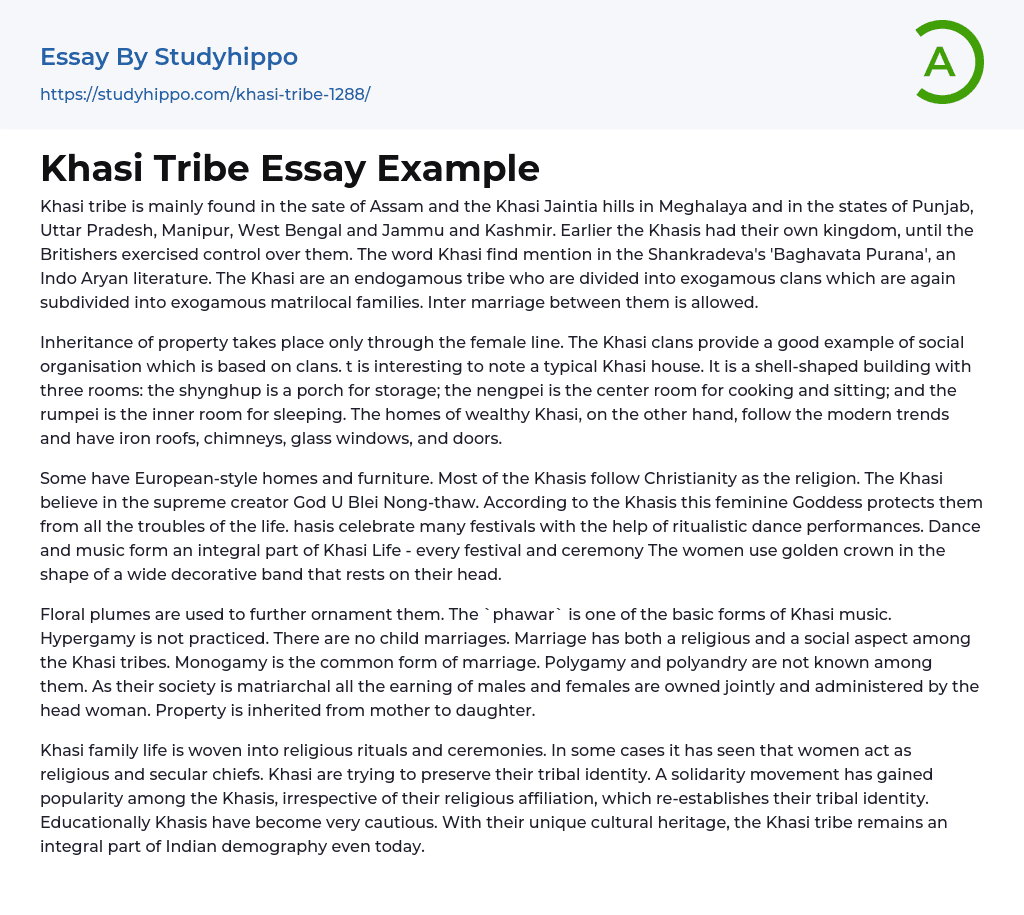Khasi tribe is mainly found in the sate of Assam and the Khasi Jaintia hills in Meghalaya and in the states of Punjab, Uttar Pradesh, Manipur, West Bengal and Jammu and Kashmir. Earlier the Khasis had their own kingdom, until the Britishers exercised control over them. The word Khasi find mention in the Shankradeva's 'Baghavata Purana', an Indo Aryan literature. The Khasi are an endogamous tribe who are divided into exogamous clans which are again subdivided into exogamous matrilocal families. Inter marriage between them is allowed.
Inheritance of property takes place only through the female line. The Khasi clans provide a good example of social organisation which is based on clans. t is interesting to note a typical Khasi house. It is a shell-shaped building with three rooms: the shynghup is a porch for storage; the ne
...ngpei is the center room for cooking and sitting; and the rumpei is the inner room for sleeping. The homes of wealthy Khasi, on the other hand, follow the modern trends and have iron roofs, chimneys, glass windows, and doors.
Some have European-style homes and furniture. Most of the Khasis follow Christianity as the religion. The Khasi believe in the supreme creator God U Blei Nong-thaw. According to the Khasis this feminine Goddess protects them from all the troubles of the life. hasis celebrate many festivals with the help of ritualistic dance performances. Dance and music form an integral part of Khasi Life - every festival and ceremony The women use golden crown in the shape of a wide decorative band that rests on their head.
Floral plumes are used to further ornament them. The `phawar` is one of the basic form
of Khasi music. Hypergamy is not practiced. There are no child marriages. Marriage has both a religious and a social aspect among the Khasi tribes. Monogamy is the common form of marriage. Polygamy and polyandry are not known among them. As their society is matriarchal all the earning of males and females are owned jointly and administered by the head woman. Property is inherited from mother to daughter.
Khasi family life is woven into religious rituals and ceremonies. In some cases it has seen that women act as religious and secular chiefs. Khasi are trying to preserve their tribal identity. A solidarity movement has gained popularity among the Khasis, irrespective of their religious affiliation, which re-establishes their tribal identity. Educationally Khasis have become very cautious. With their unique cultural heritage, the Khasi tribe remains an integral part of Indian demography even today.
- Puritans essays
- Afterlife essays
- Buddhism essays
- Christianity essays
- Deism essays
- Faith essays
- God essays
- Hinduism essays
- Islam essays
- Jews essays
- Judaism essays
- Monotheism essays
- New Testament essays
- Ritual essays
- Sin essays
- Soul essays
- Theology essays
- Confession essays
- Devil essays
- Miracle essays
- Monk essays
- Revelation essays
- Atheism essays
- Immortality essays
- Jainism essays
- Sinners essays
- Bible essays
- Old Testament essays
- Salvation essays
- Temple essays
- Taoism essays
- Pilgrimage essays
- Freedom Of Religion essays
- Existence of God essays
- Christian Worldview essays
- Cosmological Argument essays
- Gautama Buddha essays
- Karma essays
- Buddha essays
- Baptism essays
- Holy Spirit essays
- Jesus Christ essays
- Adam And Eve essays
- Crucifixion Of Jesus essays
- Crusades essays
- Eucharist essays
- God The Father essays
- Pope essays
- Protestantism essays
- Christian essays




